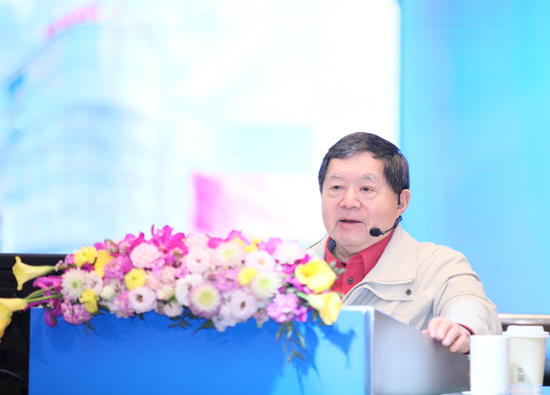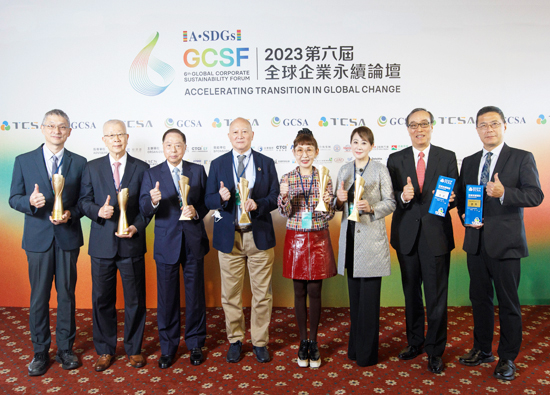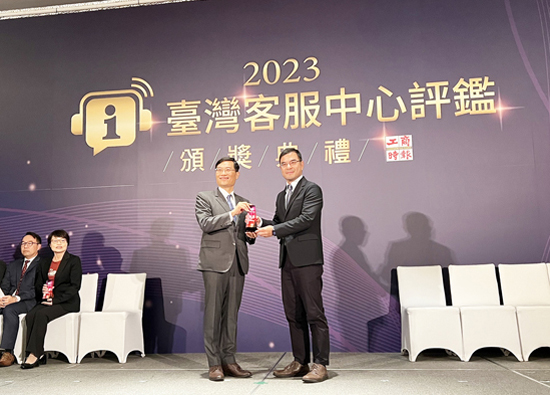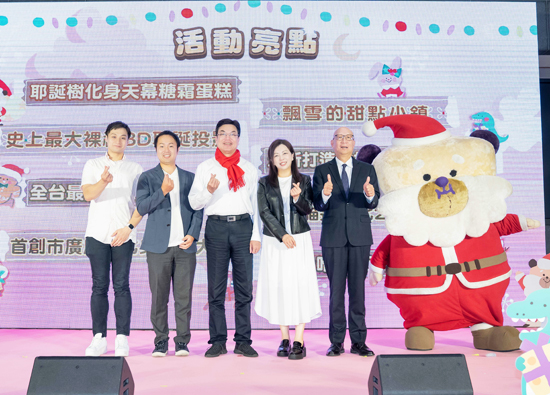01.2024 Leader's Remarks
Chairman Douglas Hsu’s Speech on 2023 Far Eastern Group Annual Strategy Meeting--Pooling Energy to Create Intelligent Future
Far Eastern Group / Chairman Douglas Hsu


With the introduction of computers and internet, the fast forward button has been pressed to accelerate their advancement in human history, the disruptive growth of AI technologies will rewrite the survival principles in the world. The future is unpredictable, risk is omnipresent, and transformation is inevitable. Are you ready to face the challenges?
Three Challenges for the Enterpris
.jpg)
Challenge I: Economy
Major institutions have different projections for the 2024 economic forecast. IMF expressed, with real estate crisis in China, volatile commodity prices, geopolitical polarizations, and inflation, global economy is stagnant. According to United Nations Conference on Trade and Development, world economies have diverged, for example the U. S. demonstrates resilience, yet Europe is at the edge of recession, overall recovery is uncertain. The World Bank pointed out that though Asian economies are the global growth engine; however, due to weakening economy in China and declining trade volume in Southeast Asian countries, growth will be sluggish in the coming year.
On the other hand, according to analysis of “Economic Intelligence Unit,” top risks in 2024 include: extended monetary tightening may lead to global recession, widespread strikes and unrest may disrupt productivity, China’s expansion of state controls caused by unsuccessful stimulation policies, and extreme weather may severely disrupt supply chain. Furthermore, the threat of Ukraine-Russia war, and Israel-Hamas war. These economic, environmental, and military turmoil may all constitute challenges to the world economy.
According to World Bank’s prediction, global fuel prices are expected to reach US$81 per barrel as global economic growth slows. However, if conflicts escalate further in the Middle East, it may erupt oil crisis like the Arab Oil Embargo in 1973, fuel price could soar to record high of more than US$150 per barrel, which will push up food prices and inflation in the developing nations.
According to surveys, more than half of global CEOs expect a recession in late 2023 or 1Q 2024, which will last to two or three quarters; 57% of leaders indicate geopolitical instability and inflation top the list of disruptive factors. Despite all this, most CEOs expect growth of their organizations over the following year.
Given the above, “volatility” is the key word of the global economic outlook for 2024, with the geopolitical factor. Each Group affiliated company should stay vigilant, seize economic momentum, and respond to all kinds of risks.
Challenge II: AI
Artificial intelligence (AI) technologies have been advancing rapidly, AI generated creation is almost surreal. AI could have huge impact on businesses. Research shows manufacturers using AI outperform competitors by 12%; and 60% of brands use AI marketing tools to stay ahead of competitors. Global organizations to see 38% CAGR in AI adoption in the coming years. Obviously, AI will affect every industry, every product, and every service.
Far Eastern leaders should embrace digital mindset, adopt AI and other digital technologies, cultivate proficiency in change management, and drive organizational change to cope with challenges brought by the new technologies. Each manager needs to understand AI and its deployment, set up target, then determine how AI can help elevate competitive edge. For example, manufacturing sectors can focus on cost reductions, automation process, or minimized downtime. Sales departments can introduce new products, services with speed, or provide superior services to elevate customer satisfaction.
Key tasks to enable AI transformation include: 1. Seek more data and master analytics capabilities, 2. Create modular, flexible IT architecture, 3. Integrate Ai into workflows to become part of daily business operations, 4. Build AI solutions across organization, cultivate AI capabilities, 5. Establish AI governance and leadership, ensure the use is in compliance with regulations, 6. Work with an ecosystem of partners to jointly promote AI innovation and developments.
.jpg)
Challenge III: Net-Zero
At COP 28, global business leaders call on governments to invest in renewable energy and power networks, suggest companies to set scientific emission reduction targets, engage suppliers and customers to reduce emissions, and increase investments in energy efficiency, and carbon reduction. They also urge enterprises and governments to collaborate deeper, accelerate Net-Zero actions, to benefit society, public health, and global economy.
Seventy percent of global GHG emissions comes from fossil fuels, therefore, to achieve Net-Zero target by 2050, aside from reducing the use of fossil fuels, we must greatly increase the portion of renewable energy. Currently, renewable energy accounts for 12% of global energy, must increase to 40% in 10 years, or even 70% in 30 years. Energy transition is inevitable and will reshape global industries and competition.
To achieve Net-Zero emission, the world is seeking faster carbon pricing mechanism. More and more nations have started to increase adoption of carbon trade and taxes. Taiwan is expected to collect carbon tax from 2025. IMF predicts carbon price will need to reach US$75 per ton by 2030 to effectively boost carbon reduction. In other words, enterprises will face increasingly rising carbon cost.
Reflecting on the Far Eastern Group, our energy structure highly depends on fossil fuels such as core. We must expedite the transformation to green energy. Carbon costs will increase after the imposing of carbon tax, impact significantly on cement and polyester manufacturing industries. Related Group companies should draw up responding measures.
Pool Energy Drive to Future
.jpg)
During the past 20 years, world economy has been growing steadily. Now with the five disrupting forces including “Aging Population,” “Skyrocketing Debt,” “Widening Income Inequality,” “Accelerating Technological Progress,” and “Climate Change Transition,” global economy has become increasingly tumultuous and unpredictable. Despite constantly increasing external risk, with the government’s limited power to maintain stable economy, the enterprise would need to be strong, consider all kinds of possible scenario, and respond with flexible strategies.
Resilient FEG Strengthen Core Competitiveness
Resilience is the power to cope with pressure and change crisis into opportunities. When encountering external shock, resilient enterprises can quickly respond, lower the impact, and show great recovery.
There are several directions to build resiliency for Far Eastern Group. First, “strengthen risk management,” not only to fortify risk awareness, but also deploy responsive strategies in advance, to elevate external trust in FEG. Second, “address underperforming units,” adjust under-performing or non-conforming to company strategy units. Third, “diversified deployment,” when facing crisis, revenue source and operational diversity can serve as buffer. Fourth, “engage with business ecosystem,” connect business ecosystem, maintain steady operation with partners, and exploit more opportunities. Fifth, “technology deployment,” on the one hand to elevate operating efficiency, on the other hand to innovate business model and satisfy customer demands. Last one is “integrate ESG into core strategy,” gain balance between growth, profit and ESG, and create maximum value for shareholders and the society.
Enhance Group Synergy Drive Technology and Green Integration
Far Eastern should accelerate transformation processes, horizontally integrate group resources to achieve two major targets of “Technology Innovation” and “Net-Zero Emission.” In terms of technology, build up comprehensive data base, systematically collect and manage Group data, engage in widespread AI applications. In terms of net-zero emission, focus on green energy construction and purchase of green power, as well as the technologies related to carbon management and investments in decarbonization.
.jpg)
Minimize Gap between High- and Mid-Level Managers
According to 2023 Group organizational health survey, satisfaction of mid-level managers is lower than that of other levels or generations, on strategy efficiency, cross-department communication, and conservative innovative culture. There exists a gap between High- and mid-level managers, which will impact the organization. Therefore, management team of each company should enhance communication, build trust, provide growth & learning opportunities, and give proper support and feedback to colleagues.
Accelerate Change in a Disruptive Era
Global CEO survey shows, 3 out of 4 say their companies are facing disruption, 75% worry that their companies are not adapting fast enough, and 98% expect to change their business models in next 3 years. Just as the saying of Jack Welch, former Chairman and CEO, GE, “Change before you have to,” leaders of the Far Eastern Group must be well prepared, focus on the important topics, accelerate to promote change, and lead the corporation to the right direction.
Jointly Respond to Key Topics for the Group
All management need to understand the current 10 key topics faced by the Group, jointly contemplate how to respond, including: break silo to strengthen horizontal communication, proactively extend cross-businesses, cross-unit collaboration, readjust organization structure of the Group’s manufacturing and service sectors, examine operational structures of Taiwan, China, and international markets, cultivate and retain adequate talent, elevate colleague’s second foreign language capabilities, develop next-generation leadership team, establish consistent group corporate image, set up target for the next 3, 5, & 10 years, embrace technologies, and continue to innovate.
#




















